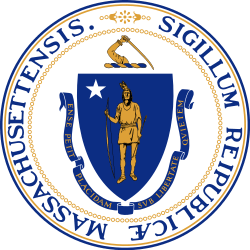Joseph Tucker (Massachusetts)
Joseph Tucker (August 21, 1832 – November 28, 1907) was an American politician who served as the 28th Lieutenant Governor for the Commonwealth of Massachusetts from 1869 to 1873.[4][5]
Joseph Tucker | |
|---|---|
| Justice of the Central Berkshire District Court | |
| In office 1873–1907 | |
| Appointed by | William B. Washburn |
| Preceded by | Henry Shaw Briggs |
| Succeeded by | Charles E. Burke |
| 28th Lieutenant Governor of Massachusetts | |
| In office 1869–1873 | |
| Governor | William Claflin William B. Washburn |
| Preceded by | William Claflin |
| Succeeded by | Thomas Talbot |
| Member of the Massachusetts Senate | |
| In office 1866–1867 | |
| Preceded by | Jonathan E. Field |
| Succeeded by | Marshal Wilcox |
| Constituency | South Berkshire District (1866) Berkshire and Hampshire District (1867) |
| Member of the Massachusetts House of Representatives from the 7th Berkshire district | |
| In office 1865[1] | |
| Preceded by | Rensselaer Couch[2] |
| Succeeded by | Mark Van Deusen[3] |
| Personal details | |
| Born | August 21, 1832 Lenox, Massachusetts |
| Died | November 28, 1907 (aged 75) Pittsfield, Massachusetts |
| Political party | Republican |
| Parents | George J. Tucker (father) Eunice Cook (mother) |
| Education | Williams College Harvard Law School |
| Military service | |
| Allegiance | |
| Branch/service | |
| Years of service | 1862–1863 |
| Rank | |
| Unit | 49th Regiment Massachusetts Volunteer Infantry[4] |
| Battles/wars | American Civil War |
Early life and career
Joseph Tucker was born in Lenox, Massachusetts on August 21, 1832 to George J. and Eunice Cook Tucker. Both his father and grandfather were treasurers of Berkshire County. Joseph's youngest brother George was also county treasurer.
Tucker graduated from Lenox Academy and attended Williams College, graduating in 1851. He then studied at Harvard Law School and was admitted to the Berkshire bar in 1854. After graduating, Tucker practiced law in St. Louis until 1860. Following the outbreak of the Civil War, Tucker worked in Great Barrington, Massachusetts.
Military career
In September 1862, Tucker enlisted in the 49th Regiment Massachusetts Volunteer Infantry. During the Red River Campaign, Tucker served as acting assistant adjutant general.
At the Battle of Plains Store, Tucker was shot in the right knee, requiring an amputation of the right leg. After the amputation, Tucker was sent home.
Political career
Tucker's political career started in November 1863 when Governor John Albion Andrew appointed him superintendent of recruiting in Berkshire County.
In 1865, Tucker won his first elected position to the Massachusetts House of Representatives. He represented the 7th Berkshire district, which encompassed his hometown of Great Barrington, as well as Alford and Monterey. While a representative, Tucker served on the Joint Committee on Military Affairs.
Tucker was elected to the Massachusetts Senate in 1866. He originally represented the South Berkshire District, encompassing Alford, Becket, Egremont, Great Barrington, Lee, Lenox, Monterey, Mount Washington, New Marlborough, Otis, Richmond, Sandisfield, Sheffield, Stockbridge, Tyringham, Washington, and West Stockbridge. In this position, Tucker served on the Senate Committee on the Judiciary and chaired the Joint Committee on Military Affairs. He also chaired the Joint Special Committee on Soldiers and Sailors, and Families of the Slain, and served on the Joint Special Committee on the Petition of Pierce, Bacon and Others, for a License Law.
In 1867, Senator Tucker was redistricted to the Berkshire and Hampshire District, encompassing Alford, Becket, Egremont, Great Barrington, Lee, Lenox, Monterey, Mount Washington, New Marlborough, Otis, Sandisfield, Sheffield, Stockbridge, Tyringham, West Stockbridge, Chesterfield, Cummington, Goshen, Huntington, Middlefield, Plainfield, and Worthington. Tucker continued to serve on the Senate Committee on the Judiciary and chair the Joint Committee on Military Affairs and Joint Special Committee on Expenditures for State Aid to Soldiers, etc. Tucker also became the chairman of the Joint Special Committee on Purchase of Western Railroad.
| Political offices | ||
|---|---|---|
| Preceded by William Claflin |
Lieutenant Governor of Massachusetts 1869 – 1873 |
Succeeded by Thomas Talbot |
See also
- 88th Massachusetts General Court (1867)
References
- "1865 House Document. Manual For The Use Of The General Court: Containing The Rules And Orders Of The Two Branches, Together With The Constitution Of The Commonwealth, And That Of The United States, And A List Of The Executive, Legislative, And Judicial Departments Of The State Government, State Institutions And Their Officers, County Officers, And Other Statistical Information". State Library of Massachusetts. Retrieved July 25, 2018.
- "1864 House Bill. Manual For The Use Of The General Court: Containing The Rules And Orders Of The Two Branches, Together With The Constitution Of The Commonwealth, And That Of The United States, And A List Of The Executive, Legislative, And Judicial Departments Of The State Government, State Institutions And Their Officers, County Officers, And Other Statistical Information". Retrieved July 25, 2018.
- "1866 House Bill. Manual For The Use Of The General Court: Containing The Rules And Orders Of The Two Branches, Together With The Constitution Of The Commonwealth, And That Of The United States, And A List Of The Executive, Legislative, And Judicial Departments Of The State Government, State Institutions And Their Officers, County Officers, And Other Statistical Information". Retrieved July 25, 2018.
- Herndon, R.; Bacon, E.M. (1896). Men of Progress: One Thousand Biographical Sketches and Portraits of Leaders in Business and Professional Life in the Commonwealth of Massachusetts. New England magazine. Retrieved 2014-11-30.
- New England Historic Genealogical Society (1908). The New England Historical and Genealogical Register. 62. The Society. ISSN 0028-4785. Retrieved 2014-11-30.
